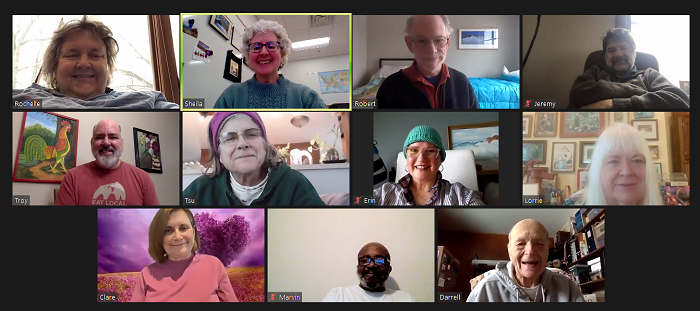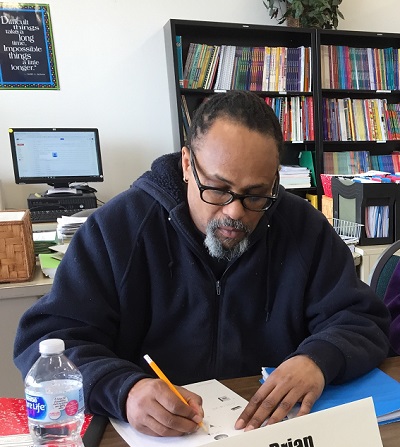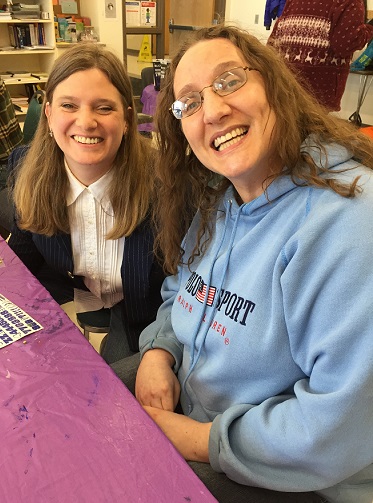- MN ABE Connect
- Archive
- Classes for Stroke and Brain Injury Survivors
 August 7, 2023
August 7, 2023
Classes for Stroke and Brain Injury Survivors
Sheila Brandes Teacher & Certified Brain Injury SpecialistCelebrities such as former Arizona congresswoman Gabby Giffords and actor Bruce Willis have raised awareness recently about aphasia, a condition that affects over two million Americans. Aphasia is a language impairment that affects the production or comprehension of speech and the ability to read, write, or use numbers. It is always acquired through an injury to the brain, such as stroke, head trauma, brain tumors, and other illnesses. No two strokes or brain injuries are exactly the same, and so aphasia exists on a continuum from mild to severe. Although they experience difficulties communicating, people with aphasia are just as smart as they have always been.
Many resources exist to assist people with aphasia: speech-language pathology, support groups, even singing groups. Professionals at the Courage Kenny Rehabilitation Institute in Golden Valley, Minnesota recognized an unmet need to provide academic instruction to individuals with aphasia and hired instructors to teach reading and math skills. Eventually, responsibility for this program was transferred to the Robbinsdale Adult Academic Program.
Today, the Classes for Stroke and Brain Injury Survivors serve students from across the Twin Cities in a program that is unique in the Metro area and possibly the state. With the advent of the hyflex model, these classes are now available in person or online to adults across Minnesota who have experienced a stroke or brain injury.
 Our mission is to assist adults with strokes and brain injuries relearn basic academic skills such as reading, vocabulary, writing, math, and computer skills that were lost due to their injuries. We offer a variety of other learning experiences as well, such as aphasia book club, writing workshop, and speaking and listening class. In addition, we help students improve confidence to perform lost skills and connect with others who face similar challenges. Because we have a teacher, educational assistants, and excellent volunteers, we are able to group students by ability or interest and meet a variety of needs.
Our mission is to assist adults with strokes and brain injuries relearn basic academic skills such as reading, vocabulary, writing, math, and computer skills that were lost due to their injuries. We offer a variety of other learning experiences as well, such as aphasia book club, writing workshop, and speaking and listening class. In addition, we help students improve confidence to perform lost skills and connect with others who face similar challenges. Because we have a teacher, educational assistants, and excellent volunteers, we are able to group students by ability or interest and meet a variety of needs.
There are four primary requirements for entry into the Classes for Stroke and Brain Injury Survivors:
- The student is an adult survivor of a documented stroke or brain injury.
- The injury occurred when the student was an adult and is the primary barrier to learning.
- The student was able to read before the injury.
- The student has a functional level that is high enough to allow the student to work independently and participate in class activities.
These guidelines reflect the fact that the Classes for Stroke and Brain Injury Survivors are designed to serve adults who have survived a stroke or brain injury, and who have a reasonable chance of recovering academic skills lost as a result of their injury. Because our mission is to assist students in recovering academic skills, we require that they had at least basic literacy skills before their injury.
Several participants shared their thoughts about our classes:
“I love school. It’s fun! I feel everyone at school knows what it’s like to have a stroke.”
Becky
“We give presentations to our class about subjects we’re interested in. We’ve talked about movies like The Wizard of Oz or Forrest Gump. Somebody talked about the artist, Hieronymus Bosch. It is fun because you never know what you are going to get – like Forrest Gump and the box of chocolates!”
Clare
 “The class and teachers accept where you are at when we practice math and reading. They are reassuring and encouraging and use a lot of different resources for us to practice academic skills.”
“The class and teachers accept where you are at when we practice math and reading. They are reassuring and encouraging and use a lot of different resources for us to practice academic skills.”
Colleen
“I’m 85 years old and have had nine strokes in 11 years. I love the interactions between the students, teachers, and volunteers. I’m always learning.”
Darrell
“Before coming to this class, I didn’t even try to read. I would get so frustrated, and I couldn’t even pronounce the words. Now I can understand what I am reading. Some stuff is coming back to me since I have been in this class.”
Henry
“My husband continues to make improvements in reading, math and speech. We are extremely thankful for this program.”
Karen
“I like the class a lot. I like the math, reading, and learning about different subjects. I really love the games we do, but I really have to concentrate!”
Margaret
“I like the people in class. We make each other laugh.”
Marvin
“Talking to others who share the same challenges is helpful. Having conservations keeps us connected.”
Peter
“We talk about books. We talk about poetry. We talk about art. It’s a bit like being in high school or college. We all learn together even though we all are different with aphasia, stroke, or brain injury. And we are friends. From Forest Lake to Rochester, from Minnetonka to Savage, we all live far away, and it works really well on Zoom.”
Rochelle
“One of the things that brings me each time is nobody makes fun of you. You can be who you are. I learn so much. Everyone is so kind. It’s a wonder-filled experience.”
Sue
“I look forward to this every week. We have camaraderie with each other.”
Troy
Class schedule and information
Classes meet Monday through Friday at the Crystal Learning Center in Crystal, Minnesota or online via Zoom. Most students attend one, two, or three days a week. Classes are held September through June, and new students can start any time during the school year. Classes are free, and students do not have to live in the Robbinsdale area school district to attend.
For more information, please call the Robbinsdale Adult Academic Program office at 763-504-8300.
Originally published 5/19/23

Newsletter Signup
Get MN ABE Connect—the official source for ABE events, activities, and resources!
Sign UpArticle Categories
- ABE Foundations/Staff Onboarding
- ACES/Transitions
- Adult Career Pathways
- Assessment
- CCR Standards
- Citizenship
- COVID-19
- Cultural Competency
- Digital Literacy/Northstar
- Disabilities
- Distance Learning/Education
- ELA
- Equity/Inclusion
- ESL
- HSE/Adult Diploma
- Listening
- Math/Numeracy
- Mental Health
- Minnesota ABE
- One-Room Schoolhouse/Multilevel
- Professional Development
- Program Management
- Reading
- Remote Instruction
- Science
- Social Studies
- Speaking/Conversation
- Support Services
- Teaching Strategies
- Technology
- Uncategorized
- Volunteers/Tutors
- Writing